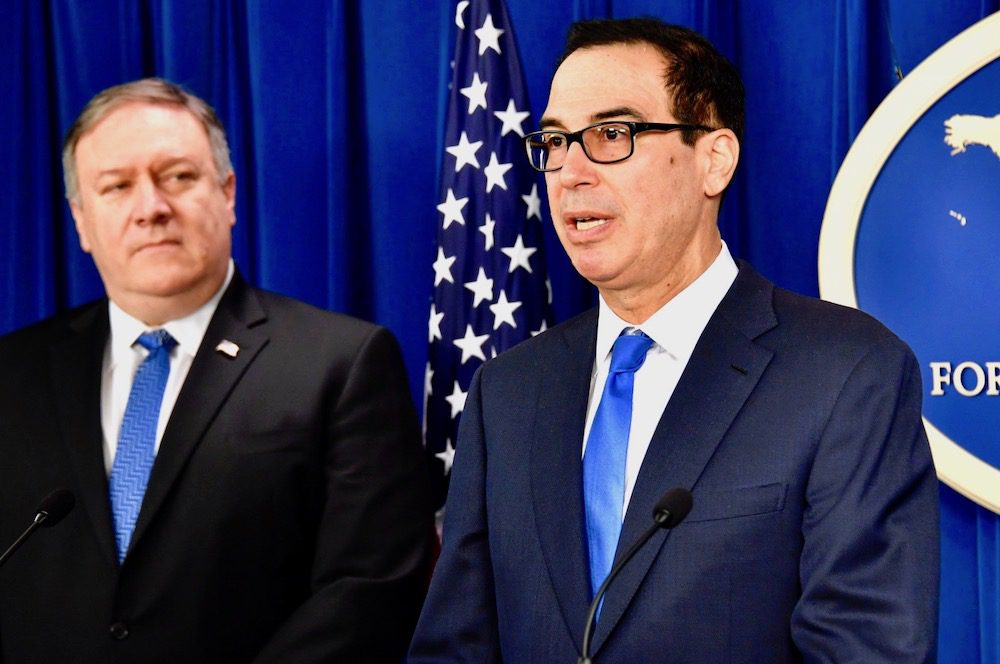Why Steve Mnuchin Wants To Be Secretary of State

Mike Pompeo’s departure from the State Department before the election in November is treated as a fait accompli in Washington.
This is to say nothing of the fact that Pompeo would be renouncing the post once held by Dean Acheson to seek a non-assured backbench Senate seat. Or the fact the impeachment imbroglio has ensnared the careerist Pompeo, as well. Or that Pompeo’s relentless job-hunting—from congressman to CIA director to secretary of state to prospective Senate candidate in under three years—collides with the emergence of real consequences of his tenure, unmasked today in the streets of Baghdad.
From Pompeo’s perspective, a Senate seat has manifold perks. If the president is pushed out this fall (or earlier) it provides the Kansas Republican a career ballast, keeping him in the game in newly Democratic D.C. If the president wins again, and governs disastrously, it affords the Machiavellian diplomat some distance. If Pompeo runs for president in 2024, a clear ambition, he’ll attempt to sell himself a statesman with a diverse portfolio, not merely a Trumpapparatchik.
And if Pompeo passes on a crowded 2024 field—a surly crew likely to include Vice President Mike Pence, former U.N. Ambassador Nikki Haley, Senator Josh Hawley, maybe even Fox ringer Tucker Carlson—he’d do so from Congress’ upper chamber, quietly building a record and biding his time. Pompeo is gambling that he can wait until perhaps late spring or even summer and clear the senatorial primary field, which includes populist favorite Kris Kobach, and win the general in typically Republican Kansas. The precedent is his would-be colleague, Senator Marco Rubio, a potential Pompeo heir, who entered the 2016 Senate race late after his failed presidential bid, but was handily swept back to power with establishment backing.
A succession struggle is afoot, with Pompeo’s own senior advisers, particularly “the politicals,” as policy aides appointed by Pompeo personally are known, fretting over their future jobs. Many renounced lucrative private sector work to serve the successor to Rex Tillerson. But c’est la vie in Donald Trump’s ephemeral Washington. Josh Rogin of The Washington Post reports the short list: Robert C. O’Brien, the new national security adviser (NSA), Rubio, überhawk Senator Tom Cotton, the Iran envoy Brian Hook, and a wildcard, Steve Mnuchin, the Treasury secretary. In an administration that has struggled, to put it mildly, with personnel, it’s a lineup remarkably similar to the cadre considered for NSA last fall.
In this new decade, let’s focus on who in some ways would be the most daring pick: Mnuchin. A pedigreed, posh former financier and political operator, the former Treasury secretary is no stranger to a gamble.
Sensing an arbitrage opportunity, Mnuchin served as Trump’s finance director when his campaign was viewed as a joke. The banker cuts the figure of a technocrat, but the truth is that raw politics a marrow-deep concern for the Treasury. At Yale, he was one of the youngest publishers of the Yale Daily News in its history, and was tapped for the secretive Skull and Bones, alma mater of the Presidents Bush and former Secretary of State John Kerry.
Quietly but decidedly, Mnuchin has demonstrated an audacious political appetite, beyond that of his famous recent predecessors, the finance-focused former executives Hank Paulson and Timothy Geithner. Later this month, Mnuchin will lead the American delegation to Davos, but this is hardly his first foray into foreign policy.
The political case for Mnuchin is fourfold.
First, he is widely viewed as having had at least a hand in the September ouster of former national security adviser John Bolton. Appearing with Pompeo hours after the Bolton’s departure, Mnuchin referred to his former ally as a mere “staff person,” while Mnuchin emphasized, “The president’s view on the Iraq War and ambassador Bolton’s was very different.” The duo’s chipper demeanor after Bolton’s banishment was noted in the Washington press corp. At the behest of Senator Rand Paul, Pompeo has also conceded Iraq was a mistake.
Second, Mnuchin has wet his beak on the subject matter by overseeing—from Iran to Venezuela to North Korea—arguably the most zealous sanctions regime in American history. Mnuchin’s approach is the heir in spirit to the one pioneered by former George W. Bush administration official Juan Zarate, the first-ever Assistant Secretary of the Treasury for Terrorist Financing and Financial Crimes, a post-9/11 innovation. In his 2013 memoir, Treasury’s War, Zarate, tight personally with Pompeo, laid out the affirmative case for “a new brand of financial war.” Treasury secretaries, especially those interested in politics, don’t just sign T-bills anymore.
Third, in an impeachment and election year, the keep-his-head-down Mnuchin would likely encounter a relatively breezy confirmation battle. Finally, Mnuchin’s crossover would have recent precedent. Jack Lew was President Barack Obama’s fix-it man, heading the Office of Management and Budget (OMB), serving as White House chief of staff, before moving over to Treasury. Mick Mulvaney, Trump’s current acting chief of staff, has had a similar rotating portfolio. And John Kelly, Mulvaney’s predecessor, moved up from Homeland Security.
Beyond personal ambition, and an enthusiasm for the power of the purse, Mnuchin’s core ideology is unknown. He clearly dissents from Bolton’s Manichean view of the international arena, but has not looked askance at a sanctions approach producing questionable results. The optimists’ case is that he would be a stand-in for Pompeo, but a less garrulous one.
Curt Mills is senior writer for The American Conservative.
Comments